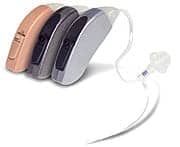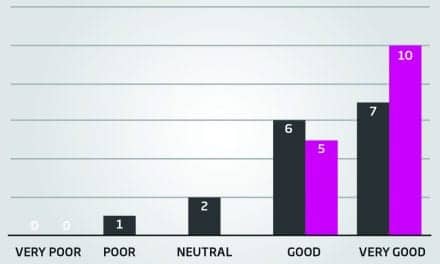Summary: Nature Communications published peer-reviewed results of Neuromod Devices’ TENT-A3 clinical trial, validating its FDA-approved bimodal tinnitus treatment device, Lenire.
Takeaways:
- Lenire’s FDA Approval: The TENT-A3 clinical trial was pivotal to Lenire’s successful De Novo FDA approval, establishing it as a tinnitus treatment device backed by multiple large-scale clinical trials.
- Clinical Efficacy: The trial demonstrated that Lenire’s bimodal neuromodulation significantly outperformed sound-only therapy, with 70.5% of participants reporting clinically meaningful improvements in tinnitus severity after treatment.
- Safety and Compliance: Lenire proved to be inherently safe, with zero device-related serious adverse events, and showed high compliance and patient satisfaction, with 88.6% of participants willing to recommend the device.
Nature Communications has published the peer-reviewed results of Neuromod Devices’ TENT-A3 (Treatment Evaluation of Neuromodulation for Tinnitus – Stage A3) clinical trial for the first and only FDA-Approved bimodal tinnitus treatment device, Lenire.
The results published in the clinical trial paper titled: Combining sound with tongue stimulation for the treatment of tinnitus: a multi-site single-arm controlled pivotal trial, were central to Lenire’s successful De Novo US FDA Grant approval.
The published paper is available at: https://www.nature.com/articles/s41467-024-50473-z
The Bimodal Neuromodulation Device for Tinnitus
Lenire is a bimodal neuromodulation device which has been shown to provide relief from tinnitus that can sustain for at least 12-months after treatment in large-scale clinical trials.[2],[3] Lenire’s bimodal neuromodulation pairs mild electrical pulses to the tongue through an intra-oral component called the Tonguetip with auditory stimulation through headphones.
TENT-A3, Neuromod’s third large-scale clinical trial for Lenire, was a controlled trial conducted as part of Lenire’s De Novo submission to the US FDA at three independent sites between March and October 2022 with 112 enrolled participants.
About Neuromod’s Clinical Trial
TENT-A3 compared Lenire’s bimodal neuromodulation mechanism to sound therapy. The trial was designed and executed with guidance from the FDA. Participants were given six weeks of sound-only stimulation as a control condition, followed by six weeks of bimodal treatment where tongue stimulation was added to the sound component.
As part of Lenire’s successful De Novo submission, Neuromod was required to demonstrate that Lenire’s bimodal neuromodulation provided additional clinically significant benefit for tinnitus when compared to sound-only stimulation. TENT-A3 demonstrated that Lenire is clinically superior to sound-only stimulation for the majority of patients with moderate or worse tinnitus.
Clinical trial data from Lenire’s De Novo submission further showed that 70.5% of participants with moderate or worse tinnitus who experienced no clinically meaningful improvement from six weeks of sound-only stimulation reported clinically significant improvement in their tinnitus severity following six weeks of treatment with Lenire.[5],[7]
The majority of participants with moderate or worse tinnitus who underwent six weeks of sound-only stimulation also reported that a further six weeks of treatment with Lenire provided additional benefit for their tinnitus.[1][5]
Impact of Tinnitus
Tinnitus, commonly known as “ringing in the ears,” is a complex neurological condition that causes a perception of sound when there is no external source. It is estimated at least 25 million Americans[6] are currently living with the condition. Tinnitus is also the most prevalent service-connected disability compensated for by The United States Veterans Administration (VA), with more than 2.9 million veterans compensated in 2023.[4]
“Tinnitus is the largest unmet need in hearing healthcare,” says Neuromod Founding CEO Ross O’Neill, PhD, “Historically, tinnitus patients have been disappointed and frustrated by products that are neither backed by compelling clinical evidence, nor cleared by regulatory authorities. With the success of TENT-A3 and the first-of-its-kind De Novo FDA-Approval, Lenire is the only tinnitus treatment backed by multiple large-scale clinical trials and approved by the US Food and Drug Administration.”
In addition to the majority of participants benefitting from bimodal neuromodulation, 82.4% were compliant to bimodal treatment and 88.6% responded that they would recommend Lenire as a tinnitus treatment[1].
“Lenire’s FDA Approval combined with the rigorous design of the device’s controlled clinical trial were compelling factors when choosing to add Lenire to the treatment options at my clinic,” says Professot Gail Whitelaw, PhD, clinic director, Fepartment of Speech and Hearing Science, The Ohio State University. “Lenire has been a landmark addition to my tinnitus toolbox and my patients have seen the benefits of overwhelmingly positive results.”
Further reading: Lenire Tinnitus Device Now a Treatment Option for US Veterans
The positive efficacy, compliance, and safety findings for TENT-A3 were highly consistent with the real-world evidence from 204 patients included in Lenire’s successful De Novo submission to the U.S. FDA. Across TENT-A3 and the Real-World Evidence, Lenire proved to be inherently safe with zero device-related serious adverse events[1]. These results build upon the success of two previous landmark clinical trials of Lenire that included more than 500 patients.[2],[3]
“The TENT-A3 controlled clinical trial was properly designed with expert guidance from the US FDA,” says Neuromod Chief Scientific Officer and University of Minnesota Professor Hubert Lim, PhD. “This interactive collaboration enabled the success of Lenire’s De Novo FDA approval, which has further established Lenire as a category-defining tinnitus intervention.”
References and Notes:
- Boedts M, B. A., Khoo G, et al. Combining sound with tongue stimulation for the treatment of tinnitus: a controlled pivotal trial. Nature communications (2024)
- Conlon et al., Sci. Transl. Med. 12, eabb2830 (2020)
- Conlon et al., Different bimodal neuromodulation settings reduce tinnitus symptoms in a large randomized trial, Sci Rep, https://www.nature.com/articles/s41598-022-13875-x (2022)
- US VA Benefits Report Fiscal Year 2023: https://www.benefits.va.gov/REPORTS/abr/
- As measured by Tinnitus Handicap Inventory (THI). THI is the most widely used clinical standard for measuring the impact of tinnitus on someone’s day-to-day life. The THI is a validated instrument that is measured on a scale of 100, the higher the score, the greater the impact of tinnitus. THI scores are categorized into five severity levels: slight, mild, moderate, severe and catastrophic. Patients that are at least moderately affected by their tinnitus have a THI score of 38 and above and fall into the moderate, severe and catastrophic categories. https://www.nidcd.nih.gov/health/tinnitus
- https://www.nidcd.nih.gov/health/tinnitus
- Neuromod Devices Ltd., Lenire (CR-201) Clinician’s Manual, (2023)





